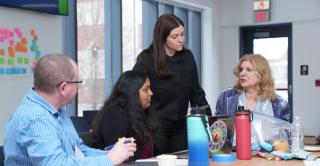
Undergraduate Degree Types
Central Connecticut State University offers over 100 undergraduate programs, each providing students with a wide range of academic options. These programs cover diverse fields of study and many offer specialized tracks for focused learning.
Bachelors of Arts (BA)
A Bachelor of Arts (BA) degree is an undergraduate qualification that offers a broad education in liberal arts and humanities. It focuses on critical thinking, communication, and cultural understanding. With diverse courses in literature, history, social sciences, and fine arts, a BA degree prepares you for various careers in fields like education, media, and public service. It's a valuable foundation for further study or entering the job market.
Bachelors of Science (BS)
A Bachelor of Science (BS) degree is an undergraduate qualification that provides a focused education in scientific and technical fields. It emphasizes practical skills, problem-solving, and research. With specialized courses in areas such as engineering, computer science, biology, or mathematics, a BS degree prepares you for careers in industries like technology, healthcare, and research. It also serves as a solid foundation for advanced studies or entering the workforce with a strong scientific background.
Undergraduate Certificate (C1)
An undergraduate certificate program is a short-term educational program that offers specialized knowledge and skills in a specific field. It provides focused training and practical experience to enhance career prospects or explore a particular area of interest. It can complement an existing degree or serve as a standalone credential. Whether seeking career advancement or personal enrichment, an undergraduate certificate program offers a targeted pathway to develop practical skills and expand professional opportunities.
Graduate Degree Types
Central Connecticut State University offers graduate degree programs in approximately 40 fields of study, with many of the degrees offering specializations that provide additional focuses.
The Master of Arts (M.A.)
The Master of Arts (M.A.) degree signifies completion of at least 30 credits of advanced study, including research and a capstone experience, which includes a thesis, special project, and/or comprehensive examination. Students in an M.A. program seek to expand their knowledge of particular subjects and may specialize in one aspect of those subjects relevant to their career goals. Students also choose an M.A. degree program when planning to continue their studies at the doctoral level.
The Master of Science (M.S.)
The Master of Science (M.S.) degree is primarily a professional degree. Some M.S. programs are designed for certified teachers and some are designed for students in other professions. Degree programs include at least 30 credits of course work and capstone experiences in the form of theses, special projects, and/or comprehensive examinations.
The Master of Arts in Teaching (MAT)
The Master of Arts in Teaching (MAT) is designed to provide an accelerated route for both a master's degree and certification to teach in shortage areas of mathematics, sciences, English, Spanish, and technology and engineering classrooms. It offers high quality, full-time, degree-bearing teacher preparation to students who have completed content area coursework required for certification and have demonstrated their command of the content area.
The Sixth-Year Certificate (SYC)
The Sixth-Year Certificate (SYC) provides graduate study beyond the master's degree for teachers and other educators. Presently offered in the fields of mathematics, reading and language arts and educational leadership, the Sixth-Year Certificate signifies completion of a program of study designed to prepare the recipient for a high level of professional practice and responsibility in public education.
The Doctor of Nurse Anesthesia Practice (DNAP)
DNAP provides a practice-based doctoral degree in nurse anesthesia that will enable critical care registered nurses to become either certified registered nurse anesthetists (CRNA) or, for those possessing a Master’s degree, to become doctorally prepared practitioners to expand their background in clinical anesthesia with a focus on advanced sciences, leadership, and patient safety.
The Ed.D. in Educational Leadership
The Ed.D. in Educational Leadership, Central's first doctoral program, serves educational leaders in Connecticut through an innovative program of study integrating course work and field studies grounded in authentic inquiry. Faculty and doctoral candidates work together to improve educational opportunities for the children and young people of Connecticut. Students accepted to the Ed.D. program proceed as a cohort through three years of intensive summer work to complete their core courses and seminar work. Students also complete a specialization and a dissertation. Students complete a minimum of 63 credits.
Post-Baccalaureate Programs
Graduate post-baccalaureate programs are available for initial teacher certification in elementary, secondary, TESOL, and prekindergarten through grade 12 fields, such as art, music, physical, special and technology and engineering education. In addition, course work taken within related degree programs (M.S. and 6th year) may lead to certification as school counselor, reading and language arts consultant, and intermediate administrator/supervisor. The office of the dean, School of Education, provides up-to-date information concerning certification programs and state requirements for certification.
Official Certificate Programs (OCP)
There are also Official Certificate Programs (OCP) in Cell and Molecular Biology, Construction Management, Data Mining, Environmental Health & Safety, Global Leadership and Literacy, Lean Manufacturing & Six Sigma, Pre-Health, Public Relations/Promotions, and Supply Chain & Logistics. Advanced OCP (master's degrees are required) are also available in Professional Counseling, Reading & Language Arts, and the Superintendent of Schools. Also available are postmaster's planned programs of study for school personnel and students interested in other areas and disciplines.



